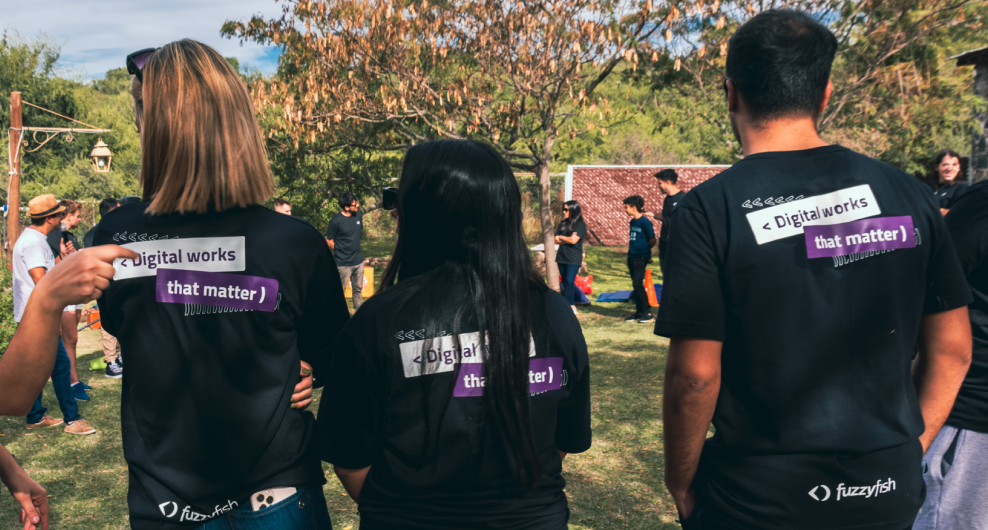How to revamp a leading company in the distribution of products for the agricultural sector, with a strong physical presence in Argentina, six branches that supply more than 3,600 stores and a stock of more than 4,000 products. The answer lies in the project that the Fuzzy Fish team designed for the client; a reliable e-commerce, 100% adapted to their requirements and scalable to their growth projections: to become a B2C platform and reach the mass consumer market.
Villanueva’s vision
Argentina is known worldwide for its large-scale agriculture and livestock industries. Within this productive sector, and with more than fifty years of experience, Villanueva is positioned as a leading company in the distribution of agricultural products. It is oriented to agricultural producers and has the widest range of products: tools and instruments for the management and care of livestock, official ear tags, veterinary supplies, rural equipment, grain and harvest accessories.
With an offer of more than 4,000 products and more than 3,600 customers in the country, Villanueva set a clear growth objective: to streamline its internal management and commercialization processes. This will be achieved by migrating to an ecommerce platform that expands its share in the domestic market, delivering orders more quickly and offering a better service. Fuzzy Fish was committed to the challenge and assigned an interdisciplinary team dedicated to researching and understanding all the client’s business processes to help them make their strategy tangible.
1st. milestone: Standardize the process
Achieving Villanueva’s growth goal required going head first with the standardization and automation of internal processes that were done originally by hand and followed different classification and management criteria. “For instance the sales and commercial areas used different categories, codes and names to designate the same thing when uploading data to the ERP system. That was the first and greatest challenge for the Fuzzy team, to standardize everything” shares the project Tech Lead.
The team took the client’s requirements document to create the estimates and tasks involved in the development. “The client had no tech definitions on the what and how, which led us to create a basic prototype and, based on their feedback, adjustments were made. To design and develop the required functionalities, we relied heavily on our experience on previous e-commerce projects”.
As the development progressed, the client began to discover that there were a lot of daily manual efforts that weren’t fully documented at the most. “One of our goals was to convert these human-executed steps into automations and algorithms, and that’s where the first definitions emerged.” Thus, the development allowed the client to proceed and automate a large part of its commercial and administrative management, providing greater clarity, knowledge and traceability of its own process.
Scope. Scope. The project began in October 2021, as an MVP planned to be developed in 8 months, which included the research and mobile and desktop design. In the first week of May 2022, the website was finalized and awaited for the client’s feedback prior to going into the scaling and maintenance phase.
2nd Milestone: Integrations with SAP and the official Livestock ear tags APIS
The development involved two main integrations:
- Connection with SAP ERP: An ERP system provides the automation, integration and intelligence essential to efficiently run all daily business operations linked to finance, logistics, services, sales, accounting, purchasing. This integration with SAP provides information to the e-commerce platform and, in order to turn it into a secure technological infrastructure, Fuzzy Fish decided to replicate it. “We decided to replicate SAP to prevent the e-commerce from crashing in case the ERP stopped responding. Thus we created a platform that is fed by SAP but that, at the same time, is independent in terms of its main functionality: the shopping cart”.
- Integration with the national livestock identification system. This integration was achieved through an api developed by Villanueva that connects with the national livestock registration system. As the api has a complex handling infrastructure, to prevent it from generating errors, the Fuzzy team deployed an automation tool that facilitates the backup of each of the queries to this api. “We have a buffer that stores all the data we get so we can pick up from where the error was generated and continue the process manually or automatically.”
3rd. Milestone: Benefits added to the purchase flow and backend
3rd. Milestone: Benefits added to the purchase flow and backend
Within the purchase flow, the user accesses a cart and can purchase their agricultural items from a wide variety of more than 4,000 products. The platform makes it easy to:
- Scroll between items through the search engine or by applying filters, access particular categories and line items.
- See all the information of the item you click on: general details, technical description, assigned discounts, promotions or applied offers.
- Add a certain quantity of an item and/or different items to the cart.
- Access the cart to see a breakdown of everything you loaded: total, subtotal, discounts applied, original price.
- Choose between home delivery or pick up from the branch and the payment method: debit in current account or through an eWallet -with credit card, debit card or physical payment at store
- If an item is out of stock, you can still buy it. A pop-up informs you of the shortage and the delivery time of the item, but the purchase is confirmed.
Special feature for the purchase of official livestock tags. Villanueva is one of the leading companies in the sale of livestock tags. The tags are part of the national livestock identification system regulated by Senasa, the Argentine official agency in charge of executing national policies on animal health and quality. This system consists of identifying the animals with a card in the left ear and a button in the right ear, which allows the producer to monitor and control his cattle, offering guarantees on their sanitary conditions. Being a legalized and highly required product, the development of Fuzzy Fish contemplated a detailed analysis of the specifications of each type of tag and the development of three modes adaptable to each typology. This possibility is unique in the market.
Self-Management Backend
- In the development of the backend, the possibility for the Villanueva seller to access a panel of pending orders and update them was contemplated. In addition, every 12 hours an automatic process runs that completes all pending operations due to a communication error with the api.
- The seller can enable items to appear in certain types of filters, ways or categories.
- REPORTING. The site allows Villanueva to view sales reports with customized metrics and to have more control over the transaction information.
4th Milestone: Scalable algorithm and north B2C
Currently it’s a B2B -Business to Business- platform, where vets and livestock producers are frequent consumers and in large quantities.The medium and long term projection is that all the functionalities will be ready to move towards a B2C -Business to Consumer- platform, that will offer products to the mass consumer market and will reach potential clients to whom they do not have access today”.
Faced with this requirement, the Fuzzy Fish team applied a particular logic that contemplates business projection in the algorithm design. “It is interesting the study and the logic we apply to the development to make it scalable in the future, based on the client’s growth projections”.
Next Challenge: Make The Environment More Stable
To host the e-commerce, the client had a VPS -virtual product service- in the cloud, hosting more services that consume resources. This infrastructure aspect led the Fuzzy Fish team to suggest improvement alternatives, which could range from hosting the services on different VPSs, allocating more resources to the current VPS, or even putting it on a physical server. This suggestion was taken into consideration by the client and is one of the next steps to be included in the planning.
For Fuzzy Fish, designing customized developments -and in this case in such a specific industry as agriculture- enriches the experience of its team of talents in order to provide expert knowledge, innovative methodologies and IT solutions to more customer segments. “In this case, we aim at designing the algorithm so that it is scalable and does not consume too many resources in the future, thinking of a platform that can grow a lot in terms of usability”, concludes Tech Lead.




